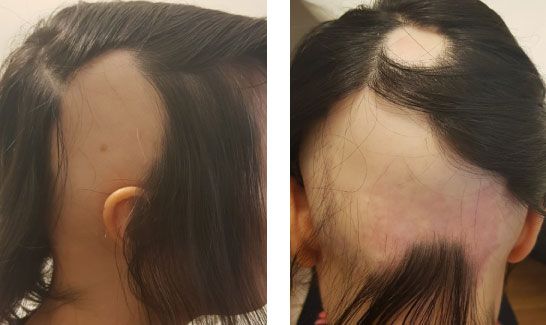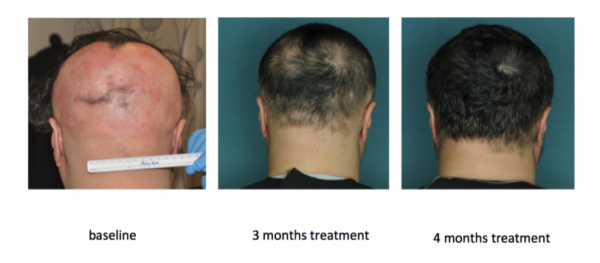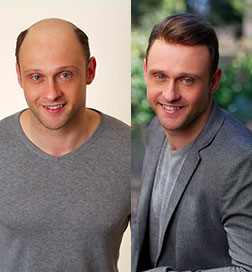Imagine working with hair loss / Alopecia patients for over a decade and then not being able to recognise them because all of their hair grew back? Apparently, this is what happened to one Doctor in New York!
Columbia geneticist Angela Christiano, PhD, has attended the annual meeting of the National Alopecia Areata Foundation, where hundreds of individuals affected by the hair loss disorder gather to support one another and learn about the latest scientific research. It’s a wonderfully safe space where patients with alopecia, many of whom have lost all their hair, joyfully remove their wigs and head coverings for the three-day celebration, without fear of shame or judgment. It’s nice!
But this year’s meeting was a bit different. Christiano had trouble recognizing conference attendees she’s known and worked with for years, because many of them now have full heads of hair. What a wonderfully awkward and embarrassing situation! We are sure it wasn’t, but one that was filled with wonder, joy and even a few tears….. of joy!
Yes, there have been some exciting breakthroughs in the hair loss space lately, and we are here for it! It has surely been a long-suffering team effort. So who are the people behind the breakthroughs, and how did they get there?
The “Grow My Hair Back” Geneticist: Dr. Angela Christiano
Geneticist Angela Christiano, PhD of Columbia University in New York has spent more than 20 years researching alopecia areata, an autoimmune disease that can cause complete hair loss, including eyebrows. It was her research that led to the USA’s Food & Drug Administration (FDA) approving the world’s first systemic treatment specifically developed for severe alopecia areata in June. If you are a regular reader of our blog, you are probably well aware what Alopecia Areata looks like. If not, see the photo below. Its a condition where the initial hair loss forms in small patches and then can spread to more pervasive areas, even potentially resulting in complete hair loss on the scalp (Alopecia Totalis) or the entire body (Alopecia Universalis).

A patient with alopecia areata
Christiano herself has suffered from the condition, which motivated her to study it – when she began working on it, no one knew exactly what caused it. Unlike hormone-driven male pattern baldness or female pattern hair thinning, alopecia areata is an autoimmune condition in which the body’s own immune system mistakenly attacks the hair follicle and shuts down hair production.
In 2010, Christiano’s team found the first clue – a gene that, when it develops abnormally, produces a “danger signal” that causes the body to recognise the hair follicle as foreign. This study led the team to focus on a specific kind of “killer” T cell that is recruited by the danger signal. This killer T cell became central to understand how hair follicle destruction occurs.
The Immunologist: The “JAK Inhibitor King”
With the help of immunologist Raphael Clynes, MD, PhD, an expert in this specific type of killer T cells in Type 1 Diabetes and cancer, the team found that inhibiting production of enzymes – known as JAK kinases – inside the killer T cells, could shut down the signaling inside the cells. They found that they could reverse the disease in mice by inhibiting the JAK pathway with drugs called JAK inhibitors.
L-R Dermatologist Julian Mackay-Wiggin, immunologist Raphael Clynes, geneticist Angela Christiano
Photo: Columbia University Irving Medical Center
“75% of patients experienced significant hair regrowth after treatment with two different JAK inhibitors”
The Dermatologist: The Hair Guru
Next, Christiano enlisted dermatologist Julian Mackay-Wiggan, MD, who specialises in hair disorders. With evidence and photos of mice with alopecia who had regrown all their hair, Mackay-Wiggan began treating a few patients with alopecia areata using JAK inhibitors that were already FDA approved for other disorders. These first few patients experienced dramatic regrowth of their hair. Additional studies by Mackay-Wiggan and Christiano and her team shows that 75% of patients experienced significant hair regrowth after treatment with two different JAK inhibitors. Soon after these findings were reported, similar reports from around the world began showing the same results.
Dramatic Hair Regrowth Leads to FDA Approval for Systemic Hair Loss Treatment
Aren’t these photos amazing of the kind of hair growth that can, and has been, achieved in 4 months of treatment?

Photo: Columbia University Irving Medical Center
When Christiano’s work began, there were no FDA approved drugs for alopecia. Quickly pharmaceutical companies began to turn their attention to developing JAK inhibitors specifically to treat alopecia areata. This led to the approval of Olumiant from Eli Lilly, with other JAK inhibitors also in late-stage clinical trials. “The impact of this treatment on patients has been truly transformative,” says Christiano.
For patients with complete hair loss, the barrage of stares and intrusive questions can be demoralizing and psychologically devastating. “It’s the stigma of unwanted attention; how do you quantify that?” says Christiano. “The impact of this treatment on patients has been truly transformative.”
While the drugs can be life-changing for patients with alopecia areata, they are not a magic bullet. The treatments are far from perfect, as they are powerful immunosuppressive drugs that necessitate risk/benefit assessments for each patient. Some patients experience a relapse of their alopecia after the treatment ends, for reasons researchers don’t yet fully understand. In addition, about a third of patients don’t respond to the drugs.
The future of hair loss treatments?
Christiano and her team are dedicated to further research, including understanding the causes of relapse after JAK inhibitor treatment, as well as more potential ways to treat the disease. They also hope to extend their insights to apply the same approaches to treat other types of hair loss – for example, in one study, the team found that JAK inhibitors also reawaken dormant hair follicles, a problem common to male and female pattern hair loss.
We look forward to future research and breakthroughs for effective treatments for hair loss and sharing them with our clients!
More information: Alopecia
Angela M. Christiano, PhD, is the Richard and Mildred Rhodebeck Professor of Dermatology, vice chair of research in the Department of Dermatology, and professor of genetics & development at Columbia University Vagelos College of Physicians and Surgeons. She also serves as an Advisory Dean for Basic Science Faculty. In 2020, Christiano was elected to the National Academy of Sciences.
Raphael Clynes, MD, PhD is currently vice president of translational biology at Xencor Inc.
Julian Mackay-Wiggan, MD, MPH, is currently in practice in the Siperstein Dermatology Group.
Angela Christiano and Raphael Clynes are co-inventors on several patents filed by Columbia University on the use of JAK inhibitors in treating hair loss disorders, which have been licensed to Aclaris Therapeutics, Inc. Angela Christiano is a shareholder of Aclaris Therapeutics, Inc. and has served as a consultant/scientific advisor for Arcutis Biotherapeutics, Inc., Almirall, S.A., Aclaris Therapeutics, Inc., Bioniz Therapeutics, Inc., Dermira, Inc., Intrinsic Medicine, Inc., Janssen Pharmaceuticals, Inc., and Pfizer, Inc. She is a shareholder of Intrinsic Medicine, Inc., has received research grant support from Bristol-Myers Squibb, Inc., Pfizer, Inc., and Sanofi Genzyme S.A. and serves on/chairs the scientific advisory boards for the Dystrophic EB Research Association of America and the National Alopecia Areata Foundation. She previously served as president of the Society for Investigative Dermatology and currently serves as president of the American Hair Research Society. She is a scientific co-founder of Rapunzel Bioscience.





